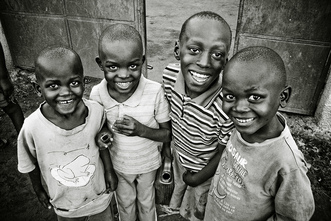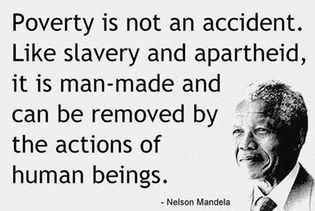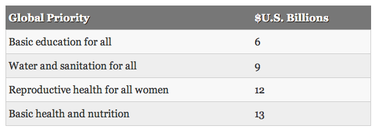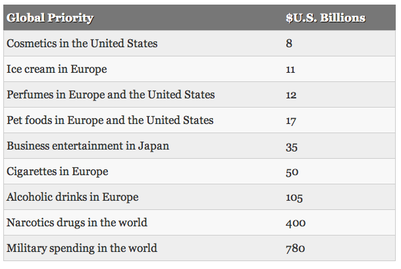
-Your rent or mortgage might be $1,000 per month, or $33 per day
-Utilities $10 per day
-Food $20 per day
-Car, car insurance, maintenance, gas $25
-TV, Internet $10
-Gym membership, movies, soccer for the kids, etc. $10
-Starbucks $3.00
That’s roughly $110 a day – or $3,300 every 30 days.
Some of you spend more, some less, but let’s narrow in on just one of those numbers, the smallest one:
Starbucks $3.00
Three bucks probably feels like nothing to you – an afterthought, a throw away for a well-deserved cup of coffee. But for a lot of people in the world, their whole daily budget is under $3.00.
How many people? This will blow your mind.
3 billion people – almost half the world’s population – live on less than $2.50 a day.
They have to provide shelter, food, clothing, medical care, transportation, education, etc. for themselves and their whole families for $2.50 a day per person.
Half the world’s population is certainly the rule, not the exception, but maybe this poverty is just confined to a few impoverished, very populous countries in sub-Saharan Africa and Southeast Asia?
At least 80% of humanity lives on less than $10 a day.
Your first instinct may be to rationalize that number by saying “Yeah, but things are so much cheaper in other countries.” I hear that a lot. Things are cheaper in other countries because people have no money, and they can't buy even a fraction of the things we have. They're eating $1 worth of food a day because that is all they have to spend, not that $1 buys the same meal that we eat. The luxuries we enjoy every day are only dreams to these people, the basics we take for granted – like clean water – are luxuries to most of the world.
Who suffers?
Children. It’s a sad reality, but children suffer the brunt of poverty, no matter what country, followed by women.
-There are 2.2 billion children in the world, and at least 1 billion of them live in poverty.
-22,000 children a day die because of poverty, according to UNICEF.
-1 in 3 children don’t have adequate shelter.
-1 in 5 don’t have access to clean water.
-1 in 7 have no access to health services.
These kids aren’t in your daily consciousness so it’s easy to push them into the back of your mind. You don’t know them, you can’t picture their faces, or hear their laughter, but they are no different than your children. They are not lazy, they haven’t made bad choices, they did nothing to deserve the poverty they were born into, but that will be their fate to endure their entire lives.
The daily reality for many of these children is living in dangerous, filthy conditions, working on the streets from the moment they can walk, scrounging for food, or worse - being forced into sex slavery.
Their growth is stunted by malnutrition, disease, and iodine deficiency. Many die of diarrhea and other preventable maladies. More than 20% never go to school, and the majority never make it past a primary school education.

No. There have always been rich and poor, but the scary thing is that the prevalence and degree of poverty are getting much worse. This isn’t a natural state, like Nelson Mandela said:
“Poverty is not an accident. Like slavery and apartheid, it is man-made and can be removed by the actions of human beings.”
In fact, 80% of the world’s population live in countries where income differentials are widening. To give you just a few examples:
-In 1960, 20% of the world’s richest countries had 30 times the income of the poorest 20%, versus:
-In 1997, the richest countries had 74 times the income of the poorest.
-The wealthiest 20% of the world (us) accounted for 75.6% of its total consumption.
-12% of the people in the world use 80% of its water.
The poverty gap is widening in the world. With all of our wealth, education, information sharing with our omnipotent media and the Internet, and the benefit of history to teach us lessons, we are not only failing, but getting worse.

The frustrating thing is that solutions are within reach. The resources are there. Simple initiatives like immunizations, clean drinking water, training healthcare workers, and education for women go a long way to alleviate these issues. Certainly, throwing money at a problem is never a panacea, and there are issues of corruption, inefficiencies of distribution, government red tape, and cultural and social norms to combat, but the world could be a much better place for so many of those in desperate poverty, especially children and women, for surprisingly little money.
How much would it cost per year, or per day, to help alleviate some of the effects of poverty?
-Basic education would cost us $6 billion dollars, or less than $1 a day for each of us.
-Water and sanitation $9 billion, or $1.50 a day.
-Reproductive health for all women in the world would only cost $12 billion, $2 a day.
-Basic health and nutrition, 13 billion, $2 a day.
That’s a sum total of 40 billion, or $5.71 spent per day for every person in the world.

Could we each find a way to fund these initiatives for $5 a day? Yes, very easily.
Here is what we spend on other luxuries
-We spend $8 billion dollars a year on cosmetics in the US.
-We spend $12 billion dollars a year on perfume in Europe and the US.
-$780 billion dollars is allocated each year in world military spending.
-Less than one 1% of what the world spends every year on weapons is needed to put every child into school.
The good news is that once these initiatives are prioritized in our global culture, many of these costs will be recouped in aid dollars spent, debt forgiveness, and future medical and humanitarian spending.
So what should we do?
I guess the first thing to do is to be conscious of all this. Next time you buy a cup of coffee, or spend $3, think about what that means to someone else in the world, your brothers and sisters, children that very easily could have been yours under other circumstances. Only by changing our culture can we refocus our priorities, and that will spark amazing change.
If you want to contribute to a cause that directly helps an impoverished person in the world, maybe a child, then email me. Certainly, I’m no expert, but I can suggest a few great organizations.
But first, be conscious, and care.
-Norm :-)
 RSS Feed
RSS Feed